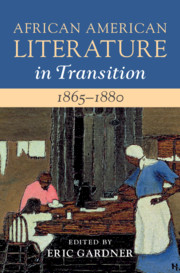Book contents
- African American Literature in Transition, 1865–1880
- African American Literature in Transition
- African American Literature in Transition, 1865–1880
- Copyright page
- Contents
- Figures
- Contributors
- Preface
- Chronology
- Black Reconstructions: Introduction
- Part I Citizenships, Textualities, and Domesticities
- Part II Persons and Bodies
- Chapter 5 Black Reform, Writing, and Resistance: Textual Politics in the Postwar Era
- Chapter 6 Post-Civil War Black Childhoods
- Chapter 7 Disabling Freedom: Bloody Shirt Rhetoric in Postbellum Slave Narratives
- Chapter 8 Radical Respectability and African American Women’s Reconstruction Fiction
- Part III Memories, Materialities, and Locations
- Index
Chapter 8 - Radical Respectability and African American Women’s Reconstruction Fiction
from Part II - Persons and Bodies
Published online by Cambridge University Press: 18 March 2021
- African American Literature in Transition, 1865–1880
- African American Literature in Transition
- African American Literature in Transition, 1865–1880
- Copyright page
- Contents
- Figures
- Contributors
- Preface
- Chronology
- Black Reconstructions: Introduction
- Part I Citizenships, Textualities, and Domesticities
- Part II Persons and Bodies
- Chapter 5 Black Reform, Writing, and Resistance: Textual Politics in the Postwar Era
- Chapter 6 Post-Civil War Black Childhoods
- Chapter 7 Disabling Freedom: Bloody Shirt Rhetoric in Postbellum Slave Narratives
- Chapter 8 Radical Respectability and African American Women’s Reconstruction Fiction
- Part III Memories, Materialities, and Locations
- Index
Summary
Brigitte Fielder’s “Radical Respectability and African American Women’s Reconstruction Fiction” begins with the serialization of Frances Ellen Watkins Harper’s Sowing and Reaping and then considers additional work by Harper and Julia C. Collins in exploring tensions between radical anti-racism and what has become known as “respectability politics.” Tracing contemporary assumptions about respectability and its limitations in reverse chronology, Fielder asserts that African American women’s Reconstruction fiction did not simply embrace the politics and processes of respectability but often refused respectability’s directionality toward outward approval. Examining concepts of self-respect and self-interest, the chapter highlights moments when texts refuse to prioritize white and/or male characters over Black women’s perspectives – a radical deviation from the usual politics of the respectable. Fielder thus locates the roots of respectability’s critique as more fully present and available to African American women writers of the late nineteenth century than most critics have acknowledged.
Keywords
- Type
- Chapter
- Information
- African American Literature in Transition, 1865–1880Black Reconstructions, pp. 187 - 210Publisher: Cambridge University PressPrint publication year: 2021

